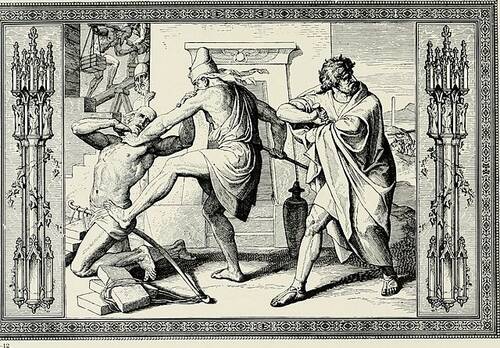Parashat Shemot 5784
01/03/2024 12:46:53 PM
LL Giordano
| Author | |
| Date Added | |
| Automatically create summary | |
| Summary |
|
Parashat Shemot 5784 / פָּרָשַׁת שְׁמוֹת to be read on January 6⎮25 Tevet In the beginning of the book of Exodus, a new Pharaoh rules Egypt. Out of fear of the strength of the Israelites, the Pharaoh enslaves them and goes so far as to command the midwives to slay the Israelite baby boys at birth. The mother of Moses saves her child by setting him afloat in a basket on the Nile. Moses is rescued from the water by Pharaoh’s daughter. Moses grows into an adult. He witnesses an Egyptian taskmaster beating an Israelite slave and kills the taskmaster. He flees to Midian and marries Zipporah only to return to Egypt to liberate the Israelites after encountering God in a burning bush. On the way, God seeks to kill Moses and is saved when Zipporah circumcises her son and consecrates him to God. Pharaoh refuses to the let the Israelites go and God promises to punish him. "...People don’t deserve freedom because they’re good. People deserve freedom because they’re people." Rabbi Joshua Gutoff points out that the experiences of Isaac and Moses are not so different (God sought to kill both for inexplicable reasons and both are saved by the magic of substitution). So it is interesting that these two men lived such radically different lives. Where Isaac appears unable to fully recover from his experience on the sacrificial altar - describing God as his Terror (Gen. 31:42, 53) and ending his days duped and unable to understand his own children - Moses becomes God's friend and the person who leads the Israelites to emancipation. What makes the difference here, according to Rabbi Gutoff - the reason why God does not become Moses' terror - is that, in response to a terrifying and dangerous God, Moses works to redeem that God, pursuing the liberation of those who suffer oppression and violence. "The act of liberation allows Moses to live with a frightening God, even an apparently demonic God, because the act of liberation is about God." LLGiordano |
Fri, October 17 2025
25 Tishrei 5786
-
Sunday ,
OctOctober 19 , 2025Board Meeting (Hybrid)
Sunday, Oct 19th 9:30a to 11:30a
-
Thursday ,
OctOctober 23 , 2025LJCC at LINK
Thursday, Oct 23rd 11:30a to 2:00p
Please sign up to help the LJCC provide lunch at LINK! We need volunteers to provide prepared dishes and to help serve. More info at https://www.signupgenius.com/go/30e0d4cafa629a46-ljcc#/ -
Saturday ,
OctOctober 25 , 2025Saturday Morning Services and Lubliner Bar Mitzvah (Hybrid)
Shabbat, Oct 25th 10:30a to 1:00p
Join us for Saturday Morning Services and add to the simcha of Duncan's becoming a Bar Mitzvah! -
Sunday ,
OctOctober 26 , 2025Community Mural Project: design meeting
Sunday, Oct 26th 4:00p to 6:00p
All LJCC members are invited to be a part of creating our community mural with local artist Dave Loewenstein! We'll be reviewing a design concept at this meeting. -
Friday ,
OctOctober 31 , 2025Shabbat-out-on-the-town!
Friday, Oct 31st 6:00p to 8:00p
Join LJCC friends and community members for a casual dinner and candlelighting at Aladdin Cafe in downtown Lawrence. -
Sunday ,
NovNovember 2 , 202562nd Annual Blintz Brunch & Bake Sale
Sunday, Nov 2nd 10:00a to 2:00p
Join us for the 62nd Annual Blintz Brunch & Bake Sale! Back by popular demand: member-made savory blintzes and fresh-made traditional bagels...and the Silent Auction! Visit BlintzBrunch.org to place your advance orders. Bagels and bake sale goods are only available to purchase the day-of. -
Friday ,
NovNovember 7 , 2025Friday Night Services with Lara Giordano & Ari Linden (Hybrid)
Friday, Nov 7th 7:00p to 9:00p
Join us for Friday Night services. Services will be followed by a potluck oneg. Let us know in the notes section what you might bring. -
Saturday ,
NovNovember 15 , 2025Saturday Services with Alyssa Appelman & Jack Winerock (Hybrid)
Shabbat, Nov 15th 10:30a to 1:00p
Join us for Saturday Morning services led by Alyssa Appelman & Jack Winerock. This event will be followed by a potluck Kiddush lunch. -
Sunday ,
NovNovember 16 , 2025Board Meeting (Hybrid)
Sunday, Nov 16th 9:30a to 11:30a
-
Sunday ,
NovNovember 16 , 2025 The Magic Eye: Healing, Spirit, and Community: A reading and discussion with Caryn Mirriam-Goldberg (Hybrid)
The Magic Eye: Healing, Spirit, and Community: A reading and discussion with Caryn Mirriam-Goldberg (Hybrid)
Sunday, Nov 16th 4:00p to 5:30p
The Magic Eye: A Story of Saving a Life & a Place in the Age of Anxiety focuses on the healing power of place and community in unfolding Caryn’s journey through a rare and dangerous eye cancer intertwined with Ken and Caryn finding a way to save the family land where they live after 35 years of effort. This memoir speaks to being part of an eco-community, human community, and especially the Lawrence Jewish Community Congregation, which Caryn will read and speak about, highlighting how her story, like many of ours, is also a spiritual excursion into finding new ways to see the world and belong to a community.
Joing our Mailing List
Email lawrencejcc@gmail.com to subscribe!
Upcoming Events:
Friday Night
| Candle Lighting : 6:22pm |
Privacy Settings | Privacy Policy | Member Terms
©2025 All rights reserved. Find out more about ShulCloud

